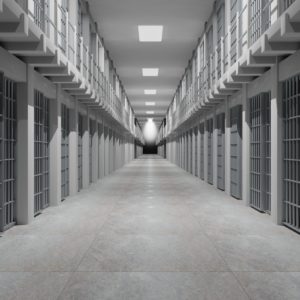The irrational political war to ban privately managed prison facilities across the country — and that fueled Democratic Gov. Gavin Newsom’s enactment last year of legislation to do just that in California — is needlessly dividing local communities and threatening their economic well-being.
Even during this COVID-19 crisis, in the spirit of never letting a crisis go to waste, activists are waging war against these federal contractors and are calling for detainees to be released across the country.
For proof, look no further than McFarland, California, a small town located just 25 miles north of Bakersfield that earned national fame in the 2015 movie McFarland USA starring Kevin Costner. McFarland, with poverty and unemployment rates well above the national average, has been struggling economically for years.
In recent weeks, it has become engulfed by controversy over a proposal by the GEO Group, a private contractor that manages detention and corrections facilities, to convert two of its soon-to-be-shuttered private prisons into Immigration and Customs Enforcement (ICE) detention centers. The atmosphere is tense, with heated rhetoric consuming the public conversation and advocates on both sides of the debate organizing and demonstrating outside of public hearings.
Opponents of the proposal — some driven by extremist ideology favoring mass prison abolition and hostility toward ICE and the enforcement of immigration laws in general — are provoking fears about stepped-up enforcement, family separation and other unfounded concerns. They baselessly tell residents that if the proposal is approved, ICE will start conducting “neighborhood sweeps” targeting McFarland families, 95 percent of whom are Hispanic.
One need only look to other nearby California cities with ICE detention centers, including Adelanto and Bakersfield, to know nothing of the sort is happening. Indeed, to an impartial observer, such claims are nothing short of outrageous.
Proponents of the McFarland conversion rightly point out the dire economic consequences that will result should the proposal ultimately fail. To say that McFarland’s economic fate is riding on the final outcome is not an overstatement.
The city, which has no fire department and only five police officers, is already on the brink of bankruptcy. If GEO-run facilities are forced to close, hundreds of jobs and hundreds of thousands of dollars in city revenue will be lost. Simply put, it would be the nail in McFarland’s economic coffin.
As McFarland Mayor Manuel Cantu — who abruptly resigned last month immediately following a deadlocked 2-2 vote by the city’s Planning Commission that temporarily halted the proposal — put it: “The protesters are demanding that these people lose their jobs, at the same time putting our finances at risk at the city of McFarland. As it is, we’re struggling. We’re in deficit spending. That means we may or may not be able to provide police, fire, our ability to provide adequate water, sewer, and refuse services.”
Accordingly, GEO is now appealing its proposal directly to the McFarland City Council.
Given the enormously high stakes, it’s time for cooler heads to prevail. As they make their decision on which way to vote, city council members must look past the animus and hyperbole that fueled the statewide legislation putting McFarland in this predicament and drive the opposition to the proposal currently before them.
The best way to start is by visiting similar facilities in nearby cities, where city council members can talk to both residents and staff, and see firsthand the conditions inside — and how the facilities impact their respective surrounding communities. What they’ll find is a far cry from the hyped rhetoric of naysayers.
I can attest to that fact personally because I have had the opportunity to visit some privately managed facilities myself.
Specifically, I toured two re-entry facilities and was able to freely interact with staff and residents who show mutual respect for each other. The staff displays remarkable desire and genuine pride in helping the residents succeed and, through the programming offered at the facilities, provide them with the tools necessary to lead successful lives when they get out. The residents speak about a newfound optimism and hope for their futures — the ability to do right and finally break the cycle that led to their incarcerations.
Far from posing a threat to the surrounding community, those facilities constitute a peaceful, constructive part of them.
The same can be said for privately run federal immigration detention centers, including those in nearby Adelanto and Bakersfield. People who have toured them report seeing “orderly, well-run and calm” environments, where guards and residents cordially interact. Residents play “soccer, basketball and other sports in recreation yards.”
Inside, they use “phones and other electronics to work on their cases and contact loved ones.” The trumped up notion that ICE is unduly stepping up enforcement and targeting families where those facilities exist has no factual basis.
Companies like GEO and Core Civic, another company that manages private prisons and detentions centers, are unfairly vilified by a constant campaign of misinformation and by politicians like Newsom and some of the candidates seeking the Democratic nomination for president.
In order to break through that prejudicial noise, it is necessary to actually explore the conditions in privately run facilities and how the people housed there are treated. Before they vote on the proposal before them, members of the McFarland City Council should do just that, instead of relying on hearsay and conjecture.
The economic future of their city, quite literally, depends on it.

